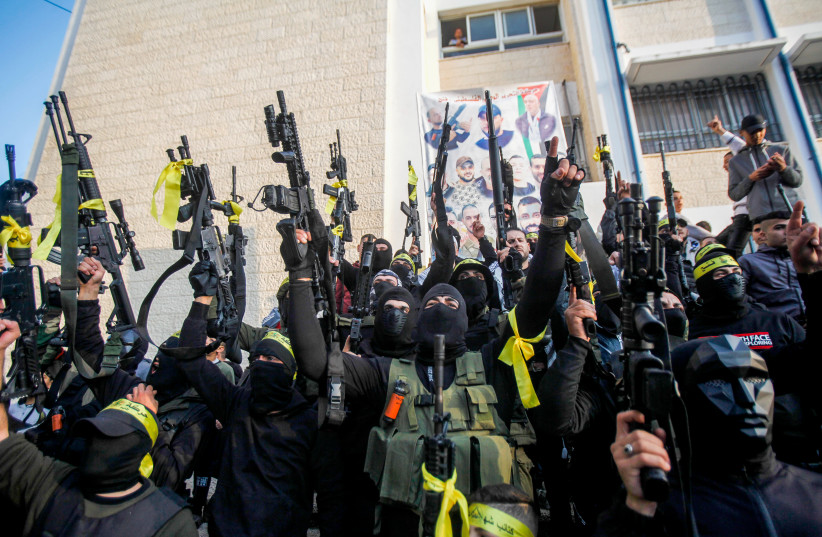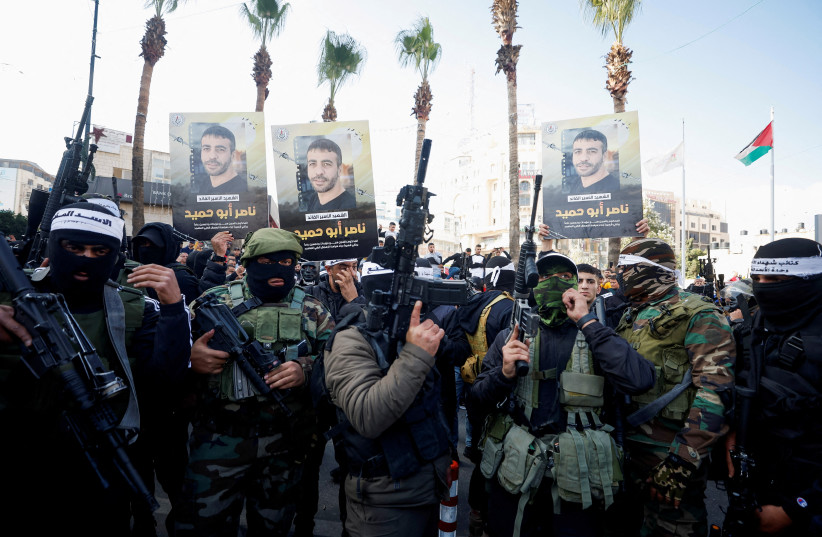For 2022-2023, until October 7, there was no question where Israel’s greatest security challenge was: the West Bank.
In comparison to earlier years, more Israelis had been killed by West Bank terror by the summer of 2023 than in any prior year of West Bank terror since the Second Intifada almost 20 years earlier.
Yet, since October 7, the government and the media have barely mentioned the West Bank security situation.
The Jerusalem Post understands that top defense officials view losing focus on West Bank terror as extremely dangerous.
The Post has learned that these officials view West Bank terror as having significantly escalated since October 7.

Shooting attacks erupt in the West Bank
According to sources, since October 7, there have been dozens of shooting attacks emanating from West Bank Palestinian terror, such that if the war in Gaza and the conflict with Hezbollah were not happening, the country would be up in arms about the government’s failure to keep the terror under wraps, or at below a certain level.
Further, sources say that the warnings for future terror attacks are higher than ever.
Simply, the public is more focused on the 1,400 Israelis killed by Hamas in the South, the IDF air strikes in Gaza which have killed more than 6,500 Palestinians, according to Hamas, and the expected ground invasion of Gaza. Hezbollah’s constant rocket and anti-tank fire has also grabbed the headlines more than West Bank terror, if for no other reason than because it has caused a large evacuation of the Israeli North, including Kiryat Shmona, a sizable city by Israeli standards.
The increased shootings and threats are the background to the IDF, Shin Bet, and other security forces arrested over 1,000 Palestinians in the West Bank since October 7, in a major escalation of night raids on Israel’s part.
True, Israel has been carrying out night raid arrests in the West Bank on a weekly and sometimes daily basis almost since the West Bank terror waves started in Spring 2022.
There was also a massive IDF operation in Jenin over July 3-4 which led to the killing or arresting of around one-third to one-half of terrorists in Jenin whom Israel was trying to prevent from future acts of terror.
But the numbers of arrests and the scale of Israeli forces involved in recent weeks have dwarfed what an average week or month would have looked like prior to October 7.
Also, unlike most of the IDF raids for 2022-2023 which were more focused on the northern West Bank, arrests are being made all over the West Bank, not just in Jenin and Nablus, but also in Hebron, and many smaller villages.
The kinds of arrests have also broadened.
The IDF has arrested Palestinian West Bank political leaders and shut down media outlets if they believed these people or outlets showed support for Hamas in the ongoing war or otherwise undermined Israeli security at this particularly sensitive time.
And not all of the arrestees are terrorists.
Of the around 1,000 Palestinians arrested, only 660, or around 66%, are affiliated with Hamas.
True, some of the remaining 340 or so arrestees could be affiliated with Islamic Jihad, the Popular Front for the Liberation of Palestine, or some other terror group.
But some of them have been arrested for non-terror issues, such as potentially low-grade public disorder or less dangerous rock throwing.
Some rocks can be lethal if thrown at passing cars from a certain angle. However, other rocks cannot be life-threatening and may even have not much more than symbolic value, if they are small and if the soldier being “targeted” has sufficient armor to negate any harm from the rock.
Many of the non-security crime detainees are being turned over to the police to be dealt with as more normal criminal cases (there can still be some twists with Palestinians who are prosecuted in IDF courts and not in Israeli civilian courts.)
Israel’s security institutions will not at this time give over the exact breakdown of where the arrestees are ending up, providing only how many are connected with Hamas.
The positive side of the massive arrests, even without much national attention, is that from a tactical perspective, Israel is likely succeeding at preempting what could have been an even larger new terror front in the West Bank in the middle of the ongoing Gaza war.
On the negative side, is Israel arresting, and especially putting in administrative detention, too many people who are not involved in actual terrorism?
Over a third of arrestees not affiliated with Hamas
The fact that 34% of arrestees are not affiliated with Hamas is high.
Even before October 7, Israel had set a record in 2023 for the highest number of Palestinians in administrative detention, one of Israel’s more controversial practices, since the First Intifada (higher than the Second Intifada) in the late 1980s.
Also, a much larger than “usual” number of Palestinians have been killed since October 7 in comparison to other periods of time.
There is an increase in reported incidents of attacks against or abuse of Palestinians by Jewish West Bank residents, the IDF, or both.
In one case, the IDF is already criminally investigating if a mix of its soldiers and Jewish West Bank residents partially tortured and partially treated inhumanely, certain Palestinians – it is still unclear if those Palestinians should not even have been arrested or could have been arrested, but not being abused.

All of this, if viewed as collective punishment and an abandonment of due process and Western evidentiary standards, could put Israel in jeopardy after the Gaza war.
The International Criminal Court, when it weighed into the Israeli-Palestinian conflict, has flagged administrative detention, arbitrary arrests, alleged extrajudicial killing, and alleged torture of Palestinians as part of the potential war crimes picture against the Jewish state.
If Israel wants to increase its chances of avoiding war crimes trials, it would be wise to be more transparent about the handling and ultimate fate of all of the new arrestees.
Returning to the security side, the government and IDF need to return to the drawing board conceptually.
Trying to achieve quiet and stability in the West Bank while the war with Gaza is still at its high point is not realistic.
But even if Israel tames Gaza with a ground invasion at some point, there is no reason to think that will end the terror waves in the West Bank.
Since Yasir Arafat died nearly 20 years ago, Israel has tried to keep the West Bank quiet with no real bigger military or diplomatic strategy to do so, instead suffering the same many occasional rounds of terror similar to what occurred with Gaza (minus the rockets.)
There are many military plans and many diplomatic plans that can be tried to achieve much more real long-term stability.
Jerusalem seems to finally be seizing the opportunity of Hamas’ October 7 monstrous invasion to chart a new strategic course with Gaza. To avoid the terror waves reaching a two-year anniversary, Israel will need to carry out a similar larger rethink regarding the West Bank.
